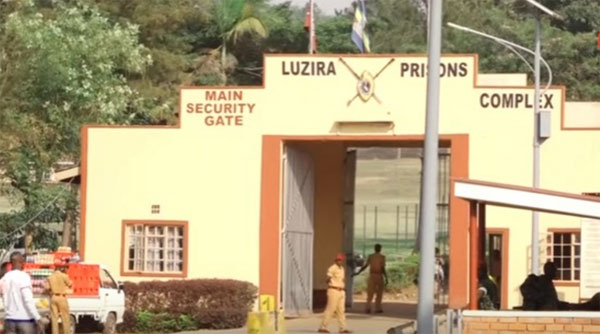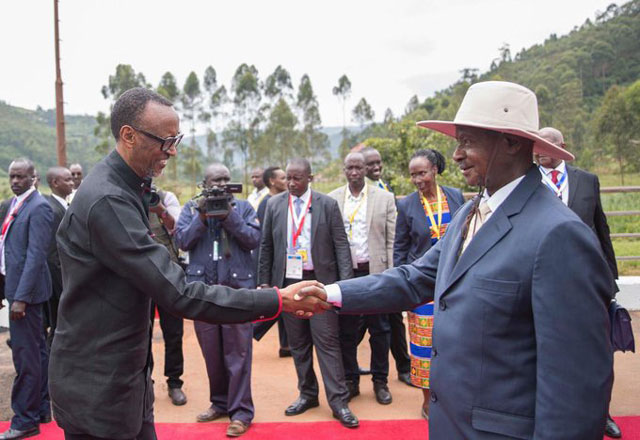
Kampala, Uganda | THE INDEPENDENT | One hundred and eighty of the 833 prisoners recently pardoned by President Yoweri Museveni were Rwandans.
The release of the 180 Rwandans is a sign that despite the disruption of the COVID-19 pandemic, Uganda is continuing to implement measures agreed in the Luanda Peace accord necessary to normalise relations with its neighbor.
Media reports indicate that authorities in Uganda have been working behind the scenes to ensure the relations between Uganda and Rwanda gets back to normal.
Senior Presidential Advisor for Special Operations Lt Gen Muhoozi Kainerugaba is one of those spearheading efforts to normalise relations, media reports indicate.
Kainerugaba has indicated as much in his recent tweets, that have had him hail the historic relationship between Ugandan and Rwandan leaders.
“The relationship between Uganda and Rwanda is beyond normal state to state relations. We are one family! No one can break the historical bonds because they are from Almighty God! We shall always be brothers and sisters. Our two great leaders shall repair the relationship,” he said in a this week tweet.
The relationship between Uganda and Rwanda is beyond normal state to state relations. We are one family! No one can break the historical bonds because they are from Almighty God! We shall always be brothers and sisters. Our two great leaders shall repair the relationship. pic.twitter.com/KSkjrTfIVi
— Muhoozi Kainerugaba (@mkainerugaba) May 14, 2020
All the behind the scenes efforts at reconciliation follow February’s 4th Quadripartite Heads of State Summit in Katuna that had set new conditions to be met before the Rwanda-Uganda border is re-opened.
Rwanda has previously accused Uganda of hosting and facilitating dissidents. It led to a standoff between the two neighbouring countries, which was heightened by the closure of the Rwandan border at Gatuna last year.
But during the Luanda summit in February, it was agreed that the two nations release prisoners being held in their countries, refrain from interference in each other’s affairs, protect the Human rights of citizens of both Uganda and Rwanda and continuation of the activities of the Ad-Hoc commission, as a mechanism for monitoring the implementation of the process.

Kagame sacks minister
Across the border, Rwanda’s President Paul Kagame recently dismissed from Cabinet, Ambassador Olivier Nduhungirehe, the country’s Foreign Affairs Minister who Ugandan observers felt was undermining the relationship between the two countries.
The outspoken Nduhungirehe had been leading the Rwanda team in talks with Uganda.
“The President of the Republic of Rwanda has removed from office Amb. Olivier Nduhungirehe for consistently acting based on personal opinions over government policies, while serving as Minister of State in the Ministry of Foreign affairs and International cooperation in charge of East African Community,” the government statement noted.
Prisoners released
The COVID-19 pandemic has seen plans for meetings after the Katuna border summit postponed indefinitely.
President Museveni on April 27 exercised the powers given to him under article 121 of the 1995 Constitution to pardon 833 prisoners around the country – including Rwandans.
Museveni’s move to pardon such a big number of prisoners was in line with the government’s efforts to decongest prisons which are said to be potential places for the spread of the coronavirus (COVID-19).
A month ago, Uganda Prisons had indicated that they had recommended to the Prerogative of Mercy committee headed by the Attorney General the release of over 2000 prisoners on minor offenses who had served three thirds of their sentences.
The constitution under article 121(4) says that: The President may on the advice of the committee [Prerogative of Mercy Committee], grant to any person convicted of an offence a pardon either free or subject to lawful conditions; grant to a person a respite, either indefinite or for a specified period, from the execution of punishment imposed on him or her for an offence; substitute a less severe form of punishment for a punishment imposed on a person for an offence; or remit the whole or part of a punishment imposed on a person or of a penalty or forfeiture otherwise due to government on account of any offence.
 The Independent Uganda: You get the Truth we Pay the Price
The Independent Uganda: You get the Truth we Pay the Price




